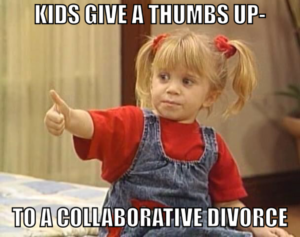Divorcing can be one of the most emotionally exhausting and challenging experiences of your adult life- especially if you have children. If not handled with care, the conflict that arises from a divorce can inflict emotional havoc on your children that may reverberate throughout their lifetime. It is not the divorce itself that can cause long-term negative  psychological effects; the conflict and hostility that can arise between parents during the process does.
psychological effects; the conflict and hostility that can arise between parents during the process does.
The environment of a collaborative divorce versus traditional litigation will likely set your children up for future emotional and psychological success. During a collaborative divorce, you and your future ex will have a team comprised of a collaborative attorney, a financial professional and usually a mental health professional. While each professional has prescribed roles in the collaborative divorce process, they all share the same goals- to facilitate positive outcomes for all involved.
Below are 3 benefits of the collaborative divorce process that you should consider:
- A Collaborative Divorce is Child-Sensitive: When children are involved, there are bound to be disagreements over parenting-time (visitation) and custody. When this occurs in a traditionally-litigated divorce, the courts and attorneys call in forensic psychological experts to conduct formalized custody, bonding, and/or parenting-fitness evaluations. These evaluations not only take months to initiate, complete and obtain a report, but also expose your child to extensive interviews and examinations that result in children feeling more emotionally conflicted. During a collaborative divorce, all of this can be avoided.
- You Maintain Control. Not the Court: During a traditionally-litigated divorce you must deal with extensions, cancellations, wait times and scheduling issues with the court. These processes can extensively drag out the process of your divorce, resulting in increased frustration, heightened emotion and an increase in moments of lapses in judgement. During a traditionally-litigated divorce, you also do not get to have much say in how you plan or structure your parenting-time or custody plans. During a collaborative divorce, you are in complete control of how long the process takes and what plans you come up with regarding parenting-time and custody. In fact, you can be as creative as you want! The shorter the process, the more manageable the emotions, the more well-adjusted your children will be.
- You Save Money: The nature of the collaborative divorce process is goal-oriented and productive. Everyone at the table is skilled at and committed to resolving conflict and makes it a priority to assist you in finding common ground and compromise. In this non-adversarial environment, time will be well-spent in formulating plans rather than focusing on areas of disagreement. Thus, the process will likely result in less money spent when compared to a traditionally-litigated divorce.
